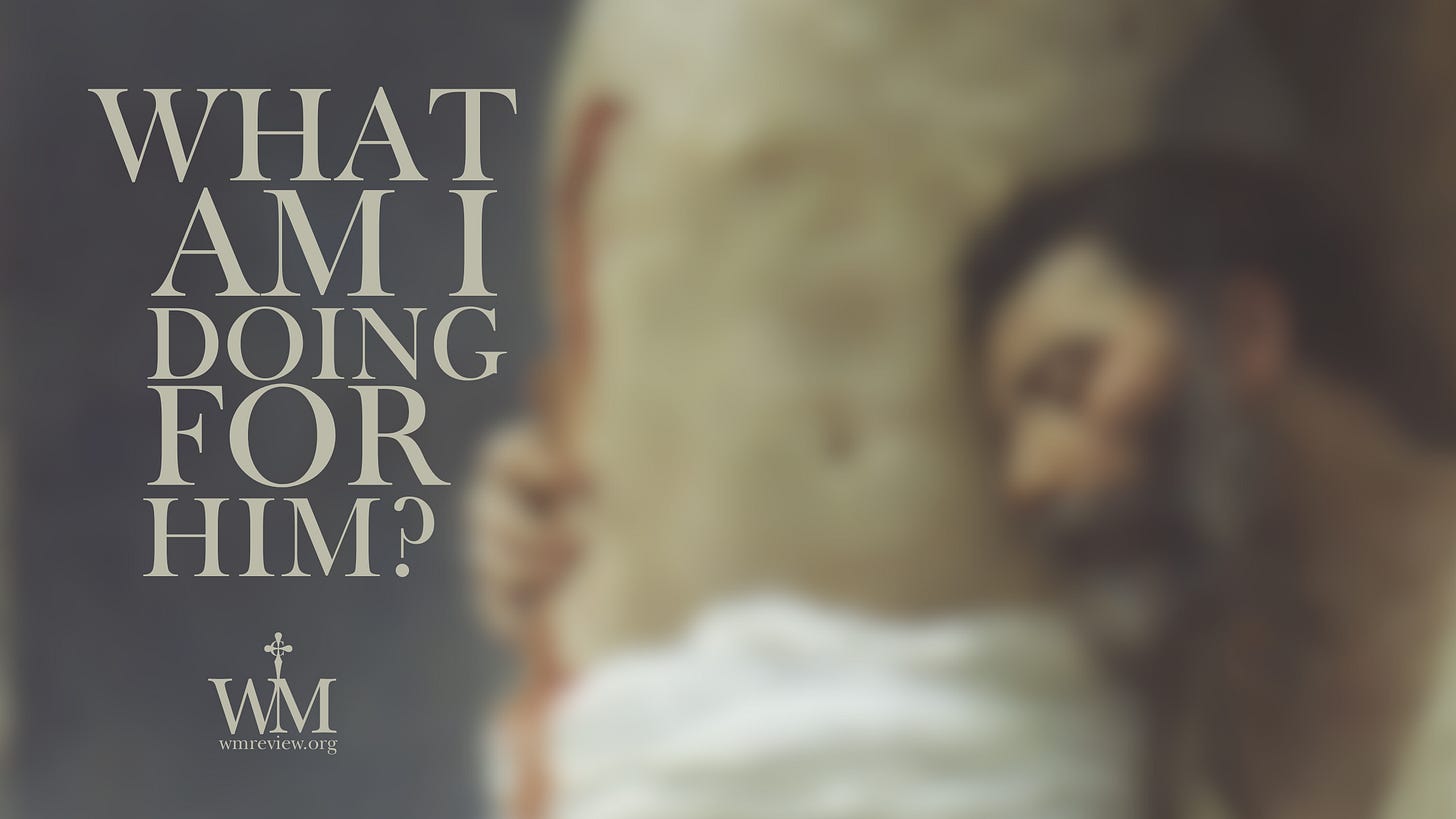
The spirit of the world is sin writ large, on a societal level. But what is sin? (Day 3 of Total Consecration)
Editor’s Notes
The first period of the preparation for St Louis de Montfort’s Total Consecration to the Blessed Virgin is focused on gaining a greater awareness of the spirit of the world, and emptying ourselves of it.
The spirit of the world is sin writ large, on a societal level. But what is sin?
The themes, as well as vocal prayers and readings associated with this ‘Week 0’, can be found here. You can find the book here.
Although this is part of the Total Consecration preparation, it also stands alone as a great text in its own right.
CONTENTS:
READING: The text consists of the first half of Fr Aloysius Ambruzzi’s commentary on The Three Sins, from St Ignatius’s Spiritual Exercises.
MEDITATION: Fr Ambruzzi’s text is intended to provide material for the meditation, which appears in point-form following it. A guide on how to use these points in meditation can be found here.
Reading: The Three Sins
The Creature’s Greatest Evil
A Companion to the Spiritual Exercises of Saint Ignatius
Fr Aloysius Ambruzzi SJ
The first Prelude is to see with the eyes of the imagination and to consider that my soul is imprisoned in this corruptible body, and my whole self in this vale, as if it were in exile amongst brute beasts.
The second Prelude is to ask for shame and confusion at myself, seeing how many have been lost for a single mortal sin, and how many times I have deserved to be condemned eternally for my numerous sins.
We cannot realize the beauty of a soul in glory—
A light upon the shining sea
The Bridegroom with His bride.
A soul in grace is a soul on its way to Heaven, and it accordingly partakes of the light and beauty of eternity. Hence its ineffable charm, whether it be the soul of a little child, or that of a sinner who has just come back to God.
The happiness of a soul in glory is perfect. A soul in grace has anticipations of it. “Blessed are ye,” says our Lord to His followers.
Man’s soul is an image and likeness of God. Its perfection and sanctity is obtained through submission to God and harmony with His Holy Will.
The soul is made to love God, first of all, and under God, all creatures.
What can possibly stain the beauty of a soul, deprive it of happiness, make sanctity impossible, and kill love? Neither persecution, nor sufferings, nor death, but sin and sin alone. Sin is the destroyer of beauty, of happiness, of sanctity, of love. Sin is essential ugliness, and misery, and malice, and ingratitude, and hatred. Heaven, Eden, Earth, and Calvary are four theatres vividly portraying the awful ravages of sin.
1. Sin in Heaven – or, the sin of the angels
God created the Angels according to His own image and likeness, and without any merit of theirs He endowed them with the most excellent gifts of nature and of grace. Pure spirits, immortal, free, and powerful above all inferior creatures, they were destined to see and possess God eternally, provided they persevered in His service and stood the trial by which God intended to test their obedience; for they had to work out their salvation by free submission to His Will.
Many of them failed. They sinned by seeking their good through their own free will, independently of the rule of the Divine Will. Their sin was one of pride. They refused subjection to God, where subjection was due. Lucifer desired to be as God. Not that he desired, St Thomas remarks, to resemble God by being subject to no one else absolutely; but he sought resemblance with God in this respect, that he wished as his supreme beatitude something which he could attain by virtue of his own nature, turning away his appetite from supernatural beatitude which is attained by God’s grace. Or, if he desired as his last end that likeness of God which is bestowed by grace, he sought to have it by the power of his own nature, and not from divine assistance according to God’s ordering.
An inexorable punishment followed the sin of the demons. They were deprived of all affective knowledge that comes from grace. Their will became obstinate in evil—what death is to us, says St John Damascene, their fall was to the angels—and they were thrown into the everlasting fire of Hell, which God purposely created for them.
“God spared not angels that sinned, but plunged them into hell’s caves, delivering them to be kept there for judgement.” (2 Pet. ii, 4)
It was to this fearful fall of the sinning angels that our Lord referred when He said: “I saw Satan like lightning falling from Heaven.” (Luke x, 18)
Absolute and eternal ugliness is the effect of the first sin.
2. Sin in Paradise – or, the sin of our first parents
God, out of His pure goodness, created our first parents according to His own image and likeness. He placed them in an earthly paradise, raised them to the supernatural state, and bestowed on them extraordinary gifts. He gave them the gift of integrity, subjecting their appetites to reason and their flesh to the spirit. He freed them from mortality and the penalties to which by nature they were subject, and granted them a free and most contented state. Man’s body was indissoluble by reason of a preternatural force given to the soul by God, whereby the soul was enabled to preserve the body from all corruption so long as it remained itself subject to God.
God gave all these gifts to Adam as the head of the human family. Adam would transmit them to his descendants, provided he kept God’s command.
Our first parents also had to work out their salvation by submission—by making use of creatures according to God’s Will. Instead they chose the free enjoyment of them, against the command of their Creator. They aspired to be gods, i.e., masters of their own destiny, and able to fashion it according to their own notions. At the suggestion of Satan—“Why hath God commanded you, that you should not eat of every tree of Paradise?”—they claimed freedom of thought and freedom of action.
Instead, they are deprived of original justice, subjected to death and to all the miseries of a corruptible body. They are cast out of Paradise to live in suffering and humiliation. With them, all their descendants are condemned, and the earth itself is cursed. Their sin has infected with its poison and corruption the whole human race throughout its long history, and has really, one might say, turned the faces of all the children of Adam in the direction of Hell.
Utter misery and suffering are the result of the second sin.
3. Essence and ravages of mortal sin
A Christian is a child of God and a member of Christ’s mystical body. He is raised to a higher level of life, to the very life of God. His actions spring from a supernatural principle of life—from grace. All of them, even the most ordinary, are divine actions, worthy of an eternal reward. Nothing can deprive him of such high dignity.
“For I am confident that neither death, nor life, nor angels, nor principalities, nor things present, nor things to come, nor powers, nor height, nor depth, nor any other creature shall be able to separate us from the Love of God in Christ Jesus our Lord.” (Rom. viii, 38, 39)
Nothing indeed, except mortal sin.
Man must attain salvation through submission and obedience, but, alas, with the rebel angels and his disobedient first parents, he too claims freedom and independence—freedom and independence of thought, of love, of action, of enjoyment. Though but a creature, a son, a soldier, and a subject, he cries non serviam to his Creator, his Father, his Commander, and his King.
Mortal sin is a turning unduly to some mutable good and a consequent turning away from God the immutable Good. The sinner disobeys God not because he loves Him not, but because he loves Him less than a creature, less than himself. Placed between God and a creature forbidden by God, he would not like to be forced to choose, but he does choose and he chooses to please himself. His conscience may yield with a pang of heart, but it yields. Every creature is but a means to serve God and to go to Him. The sinner turns it into an idol and shamefully lowers himself in front of it.
Mortal sin destroys all good things in man.
It destroys the supernatural life. By charity man is united to God, his last end and the principle of moral order. Sin is the rejection of this order.
Sin causes a stain on the soul.
“Man’s soul has a twofold comeliness; one from the refulgence of the natural light of reason, whereby he is directed in his actions; the other, from the refulgence of the Divine Light, i.e., of wisdom and grace, whereby man is also perfected for the purpose of doing good and fitting actions. Now, when the soul cleaves to things by love, there is a kind of contact in the soul: and when a man sins, he cleaves to certain things, against the light of reason and the Divine Law… The loss of comeliness occasioned by this contact is metaphorically called a stain on the soul.” (Summa, I. IIae, Q. 86, a. 1)
“The stain of sin remains in the soul even when the act of sin is past. The reason for this is that the stain… denotes a blemish in the brightness of the soul, on account of its withdrawing from the light of reason and of the Divine Law. And therefore so long as a man remains out of this light, the stain of sin remains on him… For though the act of sin ceases, whereby man withdrew from the light of reason and of the Divine Law, man does not at once return to the state in which he was before, and it is necessary that his will should have a movement contrary to the previous movement.
“Thus if one man part from another on account of some kind of movement, he is not reunited to him as soon as the movement ceases, but he needs to draw nigh to him and to return by a contrary movement.” (Summa, I. IIae, Q. 86, a. 2)
Sin deprives the sinner of all supernatural merits he may have gained. By striking at the root of the tree of life, it causes all its branches and leaves to wither.
Sin gives a certain inclination to what is evil, even as human acts produce an inclination to like acts.
Through it reason is obscured especially in practical matters, the will is hardened to evil, good actions become more difficult, and concupiscence more impetuous.
Sin incurs a debt of eternal punishment.
“If a sin destroys the principle of the order whereby man’s will is subject to God, the disorder will be such as to be considered in itself irreparable, although it is possible to repair it by the power of God. Now the principle of this order is the last end to which man adheres by charity. Therefore whatever sins turn man away from God, so as to destroy charity, considered in themselves, they incur a debt of eternal punishment.
“Sin comprises two things. First, there is the turning away from the immutable good, which is infinite, wherefore, in this respect, sin is infinite. Secondly, there is the inordinate turning to mutable good. In this respect sin is finite, both because the mutable good itself is finite, and because the movement of turning towards it is finite, since the acts of a creature cannot be infinite. Accordingly, in so far as sin consists in turning away from God, its corresponding punishment is the pain of loss, which also is infinite, because it is the loss of the infinite good, i.e., God. But in so far as sin turns inordinately to the mutable good, its corresponding punishment is the pain of sense, which also is finite.” (Summa, I. IIae, Q. 87, as. 3, 4)
We can, then, understand, how truly Christ would say, when alluding to Judas: “One of you is a devil”; and when talking of the sinner in general: “He shall be cast forth as a branch, and shall wither and they shall gather him up, and cast him into the fire, and he burneth.” (John vi, 71; xv, 6)
It is in Hell that one learns what sin is.
4. Sin, the killing of love
Sin is the killing of love.
How beautiful, how happy, and how glorious was the Son of God made Man to be, by right! But He took upon Himself to atone for the sins of mankind, and see what sin has done with Him.
Not only is mortal sin the destroyer of man’s supernatural life, but by its nature it aims at destroying God Himself. The moment God appeared in a human and passible form, sin actually killed Him.
See our Lord crucified. Behold His head crowned with thorns—His face spat upon—His eyes dimmed—His arms disjointed—His tongue embittered with gall and vinegar—His hands and feet pierced with nails—His back and shoulders torn with lashes—His soul sad unto death—His Heart immersed in an ocean of desolation!
Why is Christ hanging on the Cross?
For our sins; to avert from us the anger of His Father, and to free us from the punishment due to our sins.
And what have we done to this infinite Lover?
Alas! We have repeatedly pierced His Heart with ever new swords. We have pierced it with the sword of indifference. We professed to believe in Christ’s love, and yet that love has had no place in our heart. We have been in constant pursuit of other loves.
We have pierced Jesus’ Heart with the sword of ingratitude.
“O my people, what have I done to thee? Or in what have I afflicted thee? Answer Me.
“What more ought I to do for thee, and have not done it? I planted thee, indeed, my most beautiful vineyard: and thou art become to Me exceeding bitter: for thou hast given Me vinegar in My thirst; and with a spear thou hast pierced the side of thy Saviour.
“I went before thee in a pillar of a cloud; and thou hast brought Me to the palace of Pilate.
“I gave thee a royal sceptre: and thou hast given Me a crown of thorns.
“I have exalted thee with great strength; and thou hast hanged Me on the gibbet of the cross.”
We have pierced the Divine Heart with the sword of contempt. Urged to choose between Christ and Barabbas, i.e., the satisfaction of our passions, we have cried out: “Not this, but Barabbas.”
We have plunged in the Heart of our Creator and Lord the sword of treason. Repeatedly we swore fidelity to Christ, and yet, with Judas, we have gone to His enemies—to Satan, the world, and our passions—and asked of them: What will you give me? What pleasure and what satisfaction are you going to give me, and I will deliver Christ unto your hands to be again tortured and crucified?
And yet He is still our loving Father; He still opens His arms and His very Heart to us. What then can we do but plunge ourselves into that abyss of love and mercy to be there purified and to live, henceforth, only by its life.
At the Feet of Jesus Crucified
(Suggestions for the colloquy)
1. O my loving Saviour, why is it that Thou, the Eternal Son of God, equal to the Father, didst take upon Thyself the form of a servant—didst endure all sufferings, privations, and insults—and at the end wast nailed on a Cross? Why is Thy head crowned with thorns—Thy face spat upon—Thy eyes dimmed—Thy tongue embittered with gall and vinegar? Why are Thy arms disjointed—Thy hands and feet pierced with nails—Thy back and shoulders torn with lashes? Why is Thy Body one wound—Thy soul sad unto death—and Thy Heart immersed in an ocean of desolation?
2. Thou hast loved me and Thou hast delivered Thyself to unspeakable torments for me—to free me from the punishment due to my sins.
3. And what have I done for Thee, O God of Mercy and of Love? Alas, how often I have renewed Thy Passion by my sins! How often I have saddened Thy Heart by my ingratitude, my forgetfulness, my cowardice, and my infidelity!
4. What am I doing in the presence of Thee hanging on the Cross for me? My heart should break at the sight of Thy infinite love and of my black ingratitude, and yet I feel so cold and indifferent.
5. What must I do for Thee Who, far from rejecting such a wretch, with outstretched arms callest me to Thy Divine Heart? What must I do but plunge all my miseries into the abysses of Thy Heart—to be there purified, and to live, only by its life—full of shame and confusion, but ever trusting in Thy infinite love
Meditation for Day 3
It is in mental prayer that that much of the preparation will be achieved – and meditation is a means of entering mental prayer. See our guide to meditation for two ways to use the below texts.
The Preparation
Put away distractions and place yourself in the presence of God. (“Most holy and adorable Trinity, etc.”) Bring also the Blessed Virgin to mind, place yourself before her and ask for her assistance.
Humble yourself before God, recalling what we are in relation to God.
Say a preparatory prayer (“O my God and Sovereign Lord, etc.”)
The following are taken directly from the Spiritual Exercises.
First Prelude: This is a mental representation of the place. Attention must be called to the following point. When the contemplation or meditation is on something visible, for example, when we contemplate Christ our Lord, the representation will consist in seeing in imagination the material place where the object is that we wish to contemplate. I said the material place, for example, the temple, or the mountain where Jesus or His Mother is, according to the subject matter of the contemplation.
In a case where the subject matter is not visible, as here in a meditation on sin, the representation will be to see in imagination my soul as a prisoner in this corruptible body, and to consider my whole composite being as an exile here on earth, cast out to live among brute beasts. I said my whole composite being, body and soul.
The Second Prelude: I will ask God our Lord for what I want and desire.
The petition made in this prelude must be according to the subject matter. Thus in a contemplation on the Resurrection I will ask for joy with Christ in joy. In one on the passion, I will ask for sorrow, tears, and anguish with Christ in anguish.
Here it will be to ask for shame and confusion, because I see how many have been lost on account of a single mortal sin, and how many times I have deserved eternal damnation, because of the many grievous sins that I have committed.
The First Point: This will consist in using the memory to recall the first sin, which was that of the angels, and then in applying the understanding by reasoning upon this sin, then the will by seeking to remember and understand all to be the more filled with shame and confusion when I compare the one sin of the angels with the many sins I have committed. I will consider that they went to hell for one sin, and the number of times I have deserved to be condemned forever because of my numerous sins.
I said we should apply the memory to the sin of the angels, that is, recalling that they were created in the state of grace, that they did not want to make use of the freedom God gave them to reverence and obey their Creator and Lord, and so falling into pride, were changed from grace to hatred of God, and cast out of heaven into hell.
So, too, the understanding is to be used to think over the matter more in detail, and then the will to rouse more deeply the emotions.
Second Point: In the same way the three powers of the soul are to be applied to the sin of Adam and Eve. Recall to memory how on account of this sin they did penance for so long a time, and the great corruption which came upon the human race that caused so many to be lost in hell.
I said recall to mind the second sin, that of our First Parents. After Adam had been created on the Plain of Damascus and placed in the Garden of Paradise, and Eve had been formed from his side, they sinned by violating the command not to eat of the tree of knowledge. Thereafter, they were clothed in garments of skin and cast out of Paradise. By their sin they lost original justice, and for the rest of their lives, lived without it in many labours and great penance.
So, too, the understanding is to be used to think over the matter in greater detail, and the will is to be used as explained above.
Third Point: In like manner, we are to do the same with regard to the third sin, namely, that of one who went to hell because of one mortal sin. Consider also countless others who have been lost for fewer sins than I have committed.
I said to do the same for the third particular sin. Recall to memory the gravity and malice of sin against our Creator and Lord. Use the understanding to consider that because of sin, and of acting against the Infinite Goodness, one is justly condemned forever. Close with the acts of the will as we have said above.
The Colloquy
It would be good to recall, during this preparation for the Total Consecration, that Our Lady stood at the foot of the crucified Christ whom we are about to address – and to approach him with her.
The colloquy is made by speaking exactly as one friend speaks to another, or as a servant speaks to a master, now asking him for a favor, now blaming himself for some misdeed, now making known his affairs to him, and seeking advice in them. Close with an Our Father.
Imagine Christ our Lord present before you upon the cross, and begin to speak with him, asking how it is that though He is the Creator, He has stooped to become man, and to pass from eternal life to death here in time, that thus He might die for our sins.
I shall also reflect upon myself and ask:
“What have I done for Christ?”
“What am I doing for Christ?”
“What ought I to do for Christ?”
As I behold Christ in this plight, nailed to the cross, I shall ponder upon what presents itself to my mind.
If one feels moved to speak to God before meditating on all the points, one should certainly do so. The same applies if one feels moved to simply rest in God, rather than engaging in discursive meditation. These impulses should be followed over any particular method of meditation.
The End
End the meditation with a vocal prayer – such as the Our Father, the Anima Christi. Prayers from the Byzantine Paraclisis may be fitting for this 33-day preparation – for example:
O most holy Mother of God, save us!
O Virgin, Mother of God, I choose thee to be my protection and the shelter of my life. Do thou direct me towards your haven, for thou art the channel of all good things and the support of the faithful, O you who alone art worthy of all praise!
O most holy Mother of God, save us!
I beseech thee, O Virgin: do thou dispel the troubles of my soul, quiet the surge of my despair; for thou, O bride of God, hast carried Christ, the Prince of Peace, and thou alone are perfectly pure.1
Reflect on how well we have prayed, and how well we have followed our chosen method.
Select a spiritual nosegay from your meditation to keep with you for the rest of the day.
See you tomorrow. Hit subscribe to make sure you don’t miss it or any of our other material:
For more on the St Louis de Montfort’s True Devotion and Total Consecration, for which we are preparing, see here:
The theological basis of ‘True Devotion’ and the Consecration to Mary (Garrigou-Lagrange)
The fruits of ‘True Devotion’ and Consecration to Mary (Garrigou-Lagrange)
For more on the importance of not getting bogged down with methods, and on allowing God to act, see here:
For more on Week 0, and the vocal prayers that are are suggested for each day, see here:
‘Week 0’ of St Louis de Montfort’s Total Consecration preparation (Prayers, practices and reading)
Get the book here:
True Devotion to the Blessed Virgin Mary (St Louis de Montfort)
HELP KEEP THE WM REVIEW ONLINE WITH WM+!
As we expand The WM Review we would like to keep providing free articles for everyone.
Our work takes a lot of time and effort to produce. If you have benefitted from it please do consider supporting us financially.
A subscription gets you access to our exclusive WM+ material, and helps ensure that we can keep writing and sharing free material for all.
You can see what readers are saying over at our Testimonials page.
(We make our WM+ material freely available to clergy, priests and seminarians upon request. Please subscribe and reply to the email if this applies to you.)
Subscribe to WM+ now to make sure you always receive our material. Thank you!
If you are enjoying this preparation for Total Consecration, why not get it in mug form?
Follow on Twitter, YouTube and Telegram:
Twitter (The WM Review)
These prayers are drawn from the ‘Office of Consolation’ or the Small Paraklesis (Παράκλησις, “supplication” or “comfort”), a service of intercession addressed to the Theotokos, and written by Theophanes/Theosterictus the Monk in the 9th century. The texts have been lightly adapted from the Melkite Byzantine Daily Worship.
The Paraklesis is chanted in times of distress and sorrow of soul, and daily during the first fourteen days of August in preparation for the feast of the Assumption. It is among the most beloved devotions of the Byzantine tradition.
We are offering a selection of these prayers to be used as readers see fit – at the start or end of meditation, for morning or evening prayer, or at any other time.










